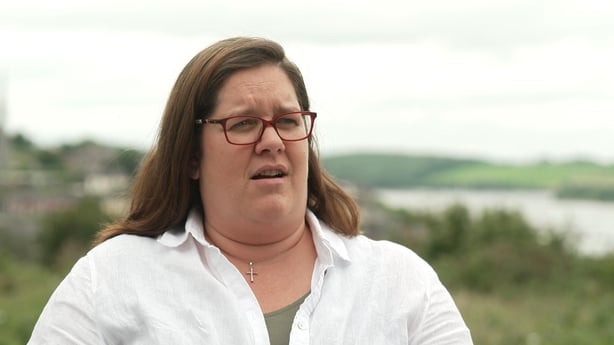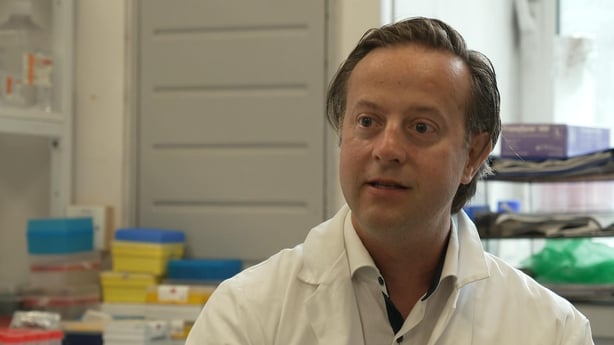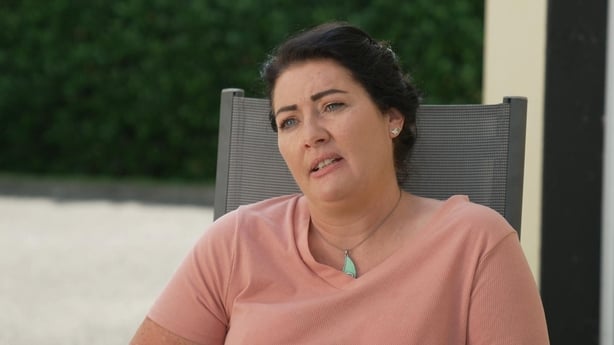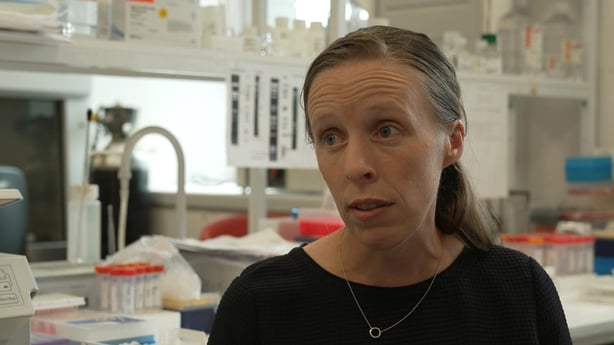When Tanja Buwalda was diagnosed with Covid-19 in March 2020, she wasn't unduly concerned. She had no temperature, no chest pain, no cough. She was just feeling tired, and as a working mother of two, Tanja was used to feeling tired. She stayed at home, resting and isolating, and waiting to get better. Instead, it got worse.
"I thought, oh, maybe it's because I haven't been exercising because I hadn't, and I started trying to get my steps in," Tanja, 46, told Prime Time.
"I remember one day I had a big, long walk here in Crosshaven and I came back and the next day I just completely crashed and I didn't get out of bed for a week."
This crippling fatigue is one of the most pervasive symptoms of Long Covid for Tanja, along with brain fog.
"I remember driving at one point last October, and I got to a point on the road and I literally couldn’t remember how to change gears in the car," she says. "I’ve been driving since I was 17. I’m 46 now. And I could not remember to change gears."
She has also suffered a range of other symptoms. "They were things that I didn’t realise were part of Long Covid," she says. "Things like diarrhea, bad digestion, heartburn that doesn’t go away, hair loss, rashes, red spots that appear out of nowhere. And it’s not like you have them all at the same time. It’s like this kind of roving symptom pattern."

Though Tanja has been officially diagnosed with Long Covid, it hasn’t helped much in her treatment plan. Doctors still know very little about what causes the condition, what the symptoms are, or, crucially, how to treat it.
Liam O’Mahony, a professor of immunology in University College Cork, said the medical community is only now really starting to investigate Long Covid, because the last 18 months was spent battling the virus itself.
Prof O’Mahony is working with Dr Corinna Sadlier, a consultant in infectious diseases in Cork University Hospital, to study Long Covid in Ireland. They have established a research group involving 200 people suffering with Long Covid, as part of an international study of 3,500 patients.
"In 25 years of working with human research, I’ve never seen anything like the extent of the severity of the disease [from Covid-19]. The impact on the immune system is tremendous," said O’Mahony.
"Even in those who are asymptomatic, the immune system is still working really, really, hard. It’s a hard job, and it does take its toll."
One theory being investigated by the medical and scientific community is that Long Covid is caused when a person’s immune system fails to settle down once the Covid virus has been effectively suppressed.
"When the immune system reacts to something like SARS-CoV-2, it really ramps up all the arms of the immune system and it knows it’s in a race," said Prof O’Mahony.
"It has to go really fast, really hard. And when it’s doing that, sometimes it can make mistakes. It can recognise or react to some of your own body tissues and cause damage. This is all designed to kill the virus [but], while fighting this virus, the immune system may mistakenly [attack] some of your own cells."
Establishing the cause of Long Covid will be crucial to finding a cure. In the meantime, around Ireland, it is estimated that tens of thousands of people are currently suffering from some form of the condition – with no end in sight.
Linda Dalton was diagnosed with Covid-19 last October. She was short of breath, had a fever, and felt very tired, but nowhere near sick enough to be hospitalised.

Ten months later, sitting in a chair outside her house in Kilkenny, Linda trembles as she recounts her story. One of her hands is wrapped in a support, and she holds it stiffly by her side. She struggles to speak fluidly, and her body is occasionally wracked with involuntary shudders. At the age of 46, she is now being cared for by her daughters and husband.
"They’re my carers now, and that’s extremely embarrassing," she says, blushing and looking down at the ground. "I need my family to help me brush my hair or get dressed. I can’t even hold my cup of tea. Sometimes, I need a straw."
Linda began suffering from a dizzying array of symptoms in the weeks after her initial diagnosis with Covid-19. It started with heart palpitations, convincing her that she was having a heart attack and went to A&E. She was sent home with steroids and told to rest.
Then, for a period, she lost the use of her right side, and her speech became slurred. Doctors thought she had had a stroke, but an MRI showed nothing. She developed a pain in her ribcage that wasn’t alleviated by even the strongest medication.
"I can’t sit in a car, because the flashing images going by, it’s too much for my brain, so I just end up falling asleep," she told Prime Time.
"So I can’t partake in family outings, and that’s gut wrenching. I’ve gone to every specialist I can think of, I’ve got no results. They look at me sometimes with puzzled heads."
The wide range of symptoms in those suffering from Long Covid has confounded doctors. One international study identified over 200 symptoms associated with the condition.

"There are groups with a very debilitating constellation of symptoms and the presentation and symptoms are quite variable across the board in terms of their severity and in terms of the system that they’re affecting," said Dr Sadlier.
"Debilitating fatigue could be a very common symptom, shortness of breath and chest pains, muscle aches, and then concentration and memory difficulties are very commonly seen also."
The Irish health system, already overrun, is badly equipped to deal with this new challenge.
With no national strategy yet rolled out to deal with Long Covid, patients face a postcode lottery in terms of their access to services and treatment. In Cork, for example, there is no dedicated clinic for Long Covid, meaning patients simply join the back of the queue.
"Unfortunately our waiting list would include patients with non-Covid issues as well as with Covid issues and they’re all bunched together at the moment," said Dr Sadlier.
"With the cyber attack, unfortunately, the waiting lists have increased further. So it’s very difficult at the moment for a lot of patients to access the care that they need."
This week, the Irish Society of Chartered Physiotherapists said it is concerned that many parts of the country don’t have access to Long Covid clinics. Physiotherapists are now treating people from as young as 16 years of age, up to 88, many of whom need to learn to breathe properly again.
The society has called for the urgent rollout of clinics to provide consistent levels of care.

In a statement to Prime Time, the HSE said: "People who have had Covid-19 are being followed up by their doctors as appropriate - this is usually their GP, and in the case of those who required hospitalisation and/or ICU admission, this is hospital-based."
It went on: "A national approach to post Covid or long Covid has been developed and the HSE are currently recruiting for the position of an Implementation Lead for a Long Covid Care Model."
In the meantime, patients are left in limbo. As much as doctors would like to give those suffering with Long Covid some prognosis – some sense of when they might recover – they are not in a position to do so.
"We don't have a simple answer for them," said Dr Sadlier. "I think as clinicians, we have to say that we're limited in what we can tell them in terms of, you know, will they recover fully from this? We don't know yet for people who have symptoms going on beyond a year."
For Linda Dalton, this is terrifying. "All the advice I’m given is to rest. Rest. Rest," she said.
"And when you are nine months locked in your bedroom, the last thing you want to do is rest again. I’m at a junction where they are saying they’re managing my symptoms."
"One doctor says I might get better in twelve years. Twelve years. I’ve already lost nearly two years. Have I got hope? No. It’s diminishing as the months go by."
Tanja, too, struggles to remain positive, but she is hopeful a day will come when a cure is found.
"You take each day as a day, you never plan anything in advance," she said.
"You try to learn to live with this within reason, because I don't accept that this is me for the long term, I do think science will catch up."




